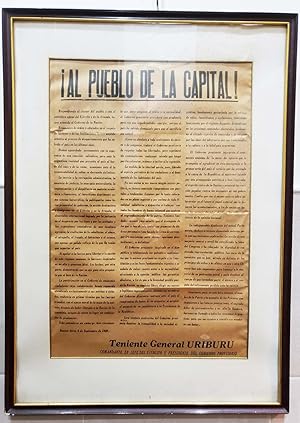uriburu jose felix (3 Ergebnisse)
Produktart
- Alle Produktarten
- Bücher (3)
- Magazine & Zeitschriften
- Comics
- Noten
- Kunst, Grafik & Poster
- Fotografien
- Karten
-
Manuskripte &
Papierantiquitäten
Zustand
Einband
Weitere Eigenschaften
- Erstausgabe (1)
- Signiert
- Schutzumschlag
- Angebotsfoto (2)
- Kein Print-on-Demand (2)
Gratisversand
Land des Verkäufers
Verkäuferbewertung
-
La batalla del Marne : apuntes y ensenanzas de la guerra actual / general Uriburu (1918) [Leatherbound]
Erscheinungsdatum: 2022
Anbieter: S N Books World, Delhi, Indien
Buch Print-on-Demand
Leatherbound. Zustand: NEW. Leatherbound edition. Condition: New. Leather Binding on Spine and Corners with Golden leaf printing on spine. Bound in genuine leather with Satin ribbon page markers and Spine with raised gilt bands. A perfect gift for your loved ones. Reprinted from 1918 edition. NO changes have been made to the original text. This is NOT a retyped or an ocr'd reprint. Illustrations, Index, if any, are included in black and white. Each page is checked manually before printing. As this print on demand book is reprinted from a very old book, there could be some missing or flawed pages, but we always try to make the book as complete as possible. Fold-outs, if any, are not part of the book. If the original book was published in multiple volumes then this reprint is of only one volume, not the whole set. IF YOU WISH TO ORDER PARTICULAR VOLUME OR ALL THE VOLUMES YOU CAN CONTACT US. Resized as per current standards. Sewing binding for longer life, where the book block is actually sewn (smythe sewn/section sewn) with thread before binding which results in a more durable type of binding. Pages: 188 Language: Spanish Pages: 188.
-
La Palabra Del General Uriburu-Discursos, Manifestos, Declaraciones, Y Cartas Publicados Durante Su Gobierno
Verlag: Roldan, Buenos Aires, 1933
Anbieter: T. A. Borden Books, Olney, MD, USA
Erstausgabe
First Edition. Paperback, Near Fine, a little browning on paper, else nice; 175 pp.
-
Al pueblo de la Capital!
Erscheinungsdatum: 1930
Anbieter: Chaco 4ever Books, Montevideo, MO, Uruguay
Buch
Sin Encuadernar. Zustand: Muy bien. Folio. One sheet of 37 x 56 cm. Framed contemporaneously. On September 6, 1930, a period marked by the irruption of authoritarianism began in Argentina. The coup d'état that overthrows President Hipólito Yrigoyen inaugurates in Argentine history a period of permanent irruptions to democratic continuity. This coup meant the return to the old practices of electoral fraud, corruption and negotiated. For this reason, this period of Argentine history is known as the " Decada infame " Infamous Decade. A growing disbelief in democracy and its institutions is observed in the population. As in Europe, certain political sectors and the Armed Forces viewed the democratic system with distrust because they believed that it would not be able to contain society and maintain order. The succession of civilian and military governments (beginning in 1930) led to a complex path in the development of national history of Argentina. The confrontations, the divisions and the tensions happened to be current in the handling of the Argentine policy. After the coup of 1930, Uriburu did not manage to govern two full years. The period was difficult, since Argentina suffered the consequences of the economic crisis of the United States (1929). On the other hand, Uriburu wanted to carry out a "corporate" project that included the reform of the National Constitution. These aspirations did not have good reception and Uriburu was losing support. This situation led him to seek an electoral solution that would allow him to withdraw from the presidency. The Concordance (union of various sectors as conservatives, independent socialists, radical dissidents, among others) won in the elections of 1931. This "triumph" was achieved through the practice of electoral fraud (the popular will would not be respected) . This practice was called patriotic fraud. In this way, it was guaranteed that governments would not fall into the hands of the "radical mob". The newly elected Agustín P. Justo (President) and Julio A. Roca (Vice President) represented the interests of the conservative sectors and allowed the return to power of the groups that had controlled it before 1916. The government took important measures, especially in the economic area, such as the signing of the Roca Runciman pact. On the other hand, the role of the State is transformed and it becomes much more active and comptroller. Facing the crisis, the government tries to make the State become a tool that allows the regulation of the economy.


![Bild des Verkäufers für La batalla del Marne : apuntes y ensenanzas de la guerra actual / general Uriburu (1918) [Leatherbound] zum Verkauf von S N Books World](https://pictures.abebooks.com/inventory/md/md30638591487.jpg)

